Ibedi Guna, Panama
![]()
![]()
![]()
![]()
![]()
![]()
![]() Click on Programs to learn more about their work in this community
Click on Programs to learn more about their work in this community
General Information
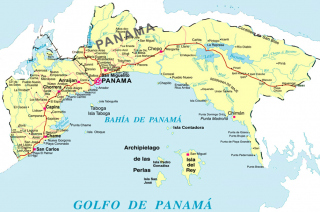
| Population* | 994 |
| Number of homes | 97 |
| Avg # of people per home | 10 |
| Electricity | 70% |
| Corregimiento | Comarca Madugandi |
| District | Chepo |
| Corresponding Health Center | Ipeti Emberá |
| Distance from compounds | 15 minutes from Tortí |
| Road conditions | poor |
* Population does not reflect how many patients will be seen on medical brigades as many people from surrounding communities come seeking medical attention.
Expressed Needs and Capacities
The community of Ibedi Guna is well organized and has many established committees and organizations within the village. They currently have a parents’ association, a women’s group, Red de Oportunidades, a Junta de Agua, and a livestock association. Areas that the community would like to improve include changing the Puesto de Salud to a Centro de Salud, organizing a health committee, and improving the sanitary as well as environmental situation.
|
Ibedi Guna has one primary school located in the center of town. There are nine teachers and six classrooms. The school also has a kitchen, a cafeteria, a playground, and pit latrines. Children travel to the town of Tortí for secondary school. |
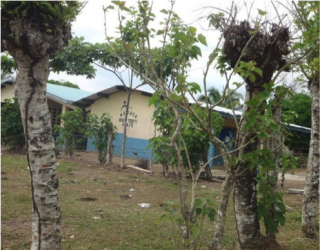 |
| Ibeti Guna has a turbine aqueduct water system that was constructed in March of 2012. Some homes have water filters, but not all. The source of water is very close to the community now that they have a turbine installed. As the system is so new, at the time the report was written it was not yet known how often the water will run during the rainy and dry season. However as the source of the aqueduct is a river located directly next to it, the community believes that running water will be available to them so long as the river has water. As of July 2012, there was no monthly fee for the aqueduct, however the water committee is considering charging each household a dollar per person each month. Ibeti has a water committee of five to seven members, but they do not meet on a regular basis. | 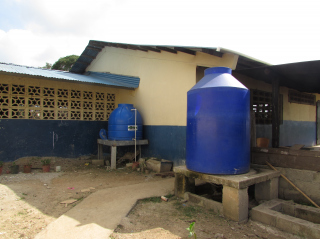 |
|
Ibeti Guna has a health clinic located in the center of the community, however it is in very poor condition. There is no electricity or running water, and they often receive many patients from surrounding communities – stressing an already weak system. Community members can also travel to Torti´s health center, located 20 minutes away by public transportation. There is one health assistant and two midwives that live in Ibeti, as well as a nurse that passes through from time to time.
The most commonly contracted illnesses in the community are diarrhea and stomach pain, skin infections, tooth infections, abscesses, and rashes. The women are more susceptible to STIs, and the children to parasites and earaches. There are no dental services in the village, but people can travel to Torti for access. The community currently receives dental and medical rounds from the Church of Christ, Global Brigades, and the National University of Panama. |
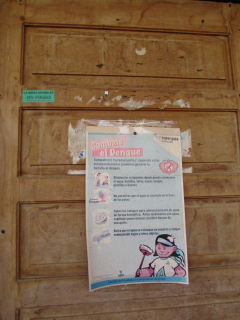 |
| The community received a project that installed 14 bathrooms, including sinks, bathtubs, and toilets for the whole community. The World Bank, the Panamanian government and a private contractor all collaborated on the project. No home has its own latrine; 10-20% of the population has stoves in their homes, and 10% have cement floors. All of the houses are made from wood with palm leaf roofs. They do not have a health committee. | |
|
The most common types of employment amongst the males are agricultural work on their own farms, repairing small boats, and raising livestock (for sale as well as personal consumption). The women make traditional crafts or take care of the home. The main crops produced are corn, rice, plantains, coffee, lemons, cocoa, yucca, avocado and yams. Chickens, pigs, and fish are also raised in the community for a personal consumption and to sell if there is extra. Within Ibeti there are three small stores as well as few individual businesses.
The population has no access to credit within or outside of the community, and no one has ever taken out a loan. Peace Corps gave a business education workshop to a group of ten women once. A part from this, the community has never received any form of business education. |
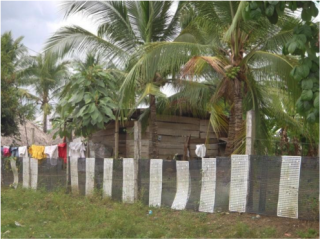 |
|
Ibeti Guna received a workshop by the organization ANAM in which they spoke about the damage of slash and burning and alternative forms of agriculture. An educational workshop about waste management was also given by the organization, Prointec. The group has given two talks and plans to follow up with two more. The community currently has no form of organized waste disposal, and they burn or throw their trash in the river. No one in the community recycles. Almost all community members practices slash and burning, and very few people use chemical products on their farms. They also say that the forms in which they plant and harvest their crops are much more sustainable in comparison to the Latino Panamanian community.
A reforestation project was done a few years ago by the organization, Barcas. Twenty-eight people are working with the local nursery and they have reforested more than 200 hectares of land. There is no environmental committee in the community. |
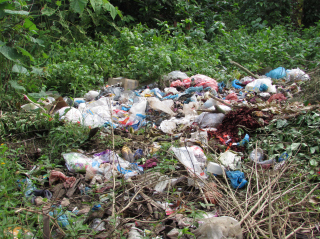 |
There are no lawyers within the community, but the majority of all issues are resolved within the community itself. People can also go to Guna Yala or Panama if a lawyer is needed. They live in a comarca, or collective land that is rightfully owned by the Guna. The main type of legal assistance needed is for limits related to their collective land. The community has never received any educational legal training.
The community of Ibedi Embera lies within the Madugandi Guna territory, where the Guna have officially held semi-autonomous status since 1986. The Guna received their partial independence from the Panamanian state in 1925 and this particular territory makes up one of several different semi-sovereign indigenous zones located throughout Panama. Locally, within the communities as well as amongst other Guna territories, their self-governing structure means that they rely mainly on a traditional hierarchy to regulate community affairs. In individual communities, the first Saila, or the community chief, delegates administrative responsibilities and acts as a moral and political leader. As the Saila represents the community and holds the authority to make decisions, Global Brigades must always look for his (the Saila is nearly always male) approval whenever doing any type of intervention in the community. However in this community it has been expressed by members that the Saila does not want to come to meetings with Global Brigades as many NGOs have already come to the community and broken their promises. The Saila’s lack of participation demonstrates a degree of unwillingness on the part of the community to work with Global Brigades.
Barcas, Prointec, ANAM, the Church of Christ, and the National University of Panama all work in Ibedi Guna
Currently, Ibedi Guna only hosts Medical/Dental brigades.
Source of information: Key informant interview
Date of interview: July 31st, 2012
Last Updated: December 19, 2013
Last Visited: December 26, 2013